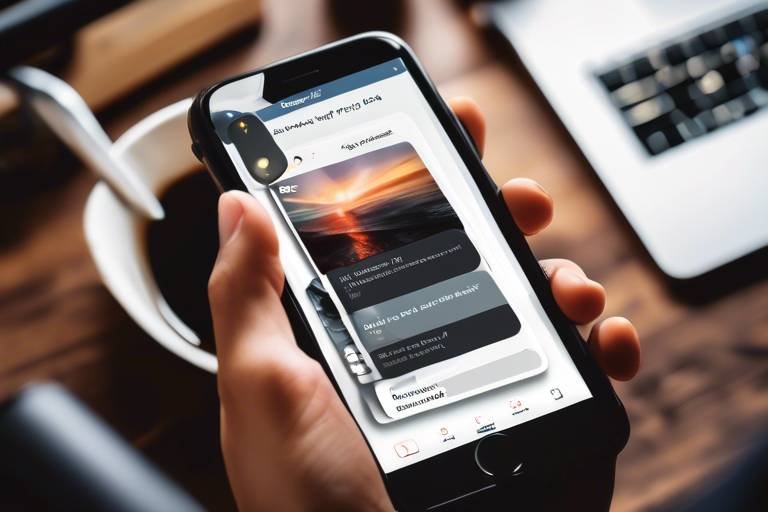How to Balance Work and Personal Life with Effective Planning
Striking a balance between work and personal life is crucial in today's fast-paced world. Effective planning plays a key role in managing these two important aspects of our lives harmoniously. By setting clear priorities, implementing time management techniques, establishing boundaries, enhancing communication skills, delegating tasks, utilizing technology wisely, practicing self-care, fostering supportive relationships, and reflecting on our choices, we can achieve a fulfilling work-life balance.

Setting Clear Priorities
Setting clear priorities is essential when it comes to balancing work and personal life effectively. By prioritizing tasks and responsibilities, you can ensure that you are focusing on the most important aspects of both your professional and personal life. This not only helps in maintaining a healthy work-life balance but also increases productivity.
When setting clear priorities, it is crucial to determine what tasks require immediate attention and which ones can be tackled later. By organizing your to-do list based on importance and deadlines, you can ensure that you are allocating your time and energy efficiently.
One effective technique for setting priorities is the Eisenhower Matrix, which categorizes tasks into four quadrants based on their urgency and importance. This method can help you identify tasks that need your immediate focus and those that can be delegated or postponed.

Time Management Techniques
Time management is crucial in achieving a harmonious work-life balance. By implementing effective techniques, you can ensure that you allocate your time efficiently to work, personal activities, and relaxation. One technique is the Pomodoro Technique, where you work for a focused 25-minute period followed by a short break. This method helps you maintain productivity while preventing burnout. Another technique is batching tasks, where you group similar activities together to minimize transitions and maximize productivity. By dedicating specific time blocks to different tasks, you can enhance your focus and efficiency.
Moreover, utilizing time blocking can be highly beneficial. This involves dividing your day into specific blocks of time dedicated to different activities. By setting clear boundaries for each task, you can prevent distractions and ensure that you stay on track. Additionally, creating a daily schedule and sticking to it can help you prioritize your tasks and manage your time effectively. By planning your day in advance, you can optimize your productivity and ensure that you make time for both work and personal commitments.
Furthermore, incorporating task prioritization into your time management strategy is essential. By identifying the most important tasks and tackling them first, you can ensure that you focus on high-impact activities and avoid feeling overwhelmed. Prioritizing tasks based on deadlines, importance, and urgency can help you make the most of your time and achieve a sense of accomplishment.
Remember, effective time management is not about doing more in less time but rather about doing the right things at the right time. By implementing these techniques and strategies, you can optimize your time, enhance your productivity, and strike a balance between your work and personal life.

Establishing Boundaries
When it comes to maintaining a healthy work-life balance, establishing boundaries is crucial. Imagine your life as a house with different rooms for work, family, friends, and personal time. Each room needs its own space and time to thrive without intruding on the others. By setting clear boundaries, you create a structure that prevents work from seeping into your personal life and vice versa.
Boundaries can take various forms, such as setting specific work hours and sticking to them, designating certain areas of your home for work-related activities only, or establishing rules for when and how you engage with work emails and messages outside of office hours. These boundaries act as guardrails, guiding you towards a balanced lifestyle and protecting your well-being.
Moreover, boundaries are not just about separating work from personal life; they also involve learning to say no when necessary. By understanding your limits and priorities, you can politely decline tasks or commitments that may overwhelm you and disrupt your balance. It's like knowing when to close the door to prevent unwanted guests from barging in and disrupting your peace.
Think of boundaries as the fences around a garden, protecting your precious flowers from being trampled on. By establishing clear boundaries, you cultivate a sense of respect for your time, energy, and personal space, creating a harmonious environment where both work and personal life can flourish without overshadowing each other.

Effective Communication Skills
Effective communication skills play a crucial role in maintaining a healthy work-life balance. By honing your ability to communicate effectively, you can manage expectations both at work and home, leading to smoother interactions and reduced misunderstandings. Clear and concise communication can help you convey your needs and boundaries to colleagues and loved ones, fostering mutual understanding and respect.
One effective communication technique is active listening, where you focus on what the other person is saying without interrupting. This not only demonstrates your respect for their thoughts and feelings but also ensures that you fully grasp the message being conveyed. Additionally, using empathy in your communication can help you connect with others on a deeper level, leading to more meaningful relationships and smoother collaborations.
When communicating in a professional setting, it's essential to be assertive yet respectful. Clearly articulating your thoughts and opinions while also being open to feedback can foster a positive and productive work environment. Moreover, understanding non-verbal cues and body language can enhance your communication skills, allowing you to pick up on subtle signals and adjust your approach accordingly.
Utilizing technology can also aid in effective communication, especially in today's digital age. Tools such as email, instant messaging, and video conferencing can facilitate quick and efficient exchanges, enabling you to stay connected with colleagues and family members even when physically apart. However, it's important to strike a balance and not let technology overshadow face-to-face interactions, which are essential for building strong relationships.

Delegating Tasks
When it comes to balancing work and personal life, one effective strategy is . Delegating involves assigning responsibilities to others, which not only lightens your workload but also frees up valuable time for personal activities and relaxation. It allows you to focus on high-priority tasks that require your expertise while empowering team members to contribute to the overall success of the project or organization.
Delegating tasks is not about offloading work onto others but rather about efficiently distributing responsibilities based on individual strengths and skills. By delegating effectively, you can optimize productivity, enhance collaboration within the team, and achieve better outcomes in a shorter amount of time. It also provides an opportunity for team members to develop new skills and grow professionally.
One key aspect of successful delegation is clear communication. Clearly define the tasks, expectations, deadlines, and desired outcomes when assigning responsibilities to team members. Encourage open communication and provide necessary support and resources to ensure that the delegated tasks are completed successfully. Regular check-ins and feedback sessions can help monitor progress and address any challenges that may arise.
Delegating tasks also helps in building trust within the team. When team members feel trusted and valued, they are more motivated to deliver quality work and take ownership of their assigned tasks. Trust is a crucial element in fostering a positive work environment and promoting collaboration and mutual respect among team members.
Moreover, delegating tasks allows you to focus on strategic decision-making and long-term planning. By entrusting routine or less critical tasks to others, you can dedicate your time and energy to high-level responsibilities that require your attention and expertise. This strategic approach not only improves efficiency but also enables you to contribute more effectively to the overall goals and objectives of the organization.

Utilizing Technology Wisely
When it comes to balancing work and personal life, one of the key strategies is utilizing technology wisely. In today's digital age, technology can either be a blessing or a curse, depending on how it is used. By harnessing the power of technology effectively, individuals can streamline work processes, improve time management, and create more time for personal activities.
One way to utilize technology wisely is by using productivity tools and apps that help organize tasks, set reminders, and track progress. These tools can help individuals stay on top of their work responsibilities, allowing them to focus on personal activities without the stress of looming deadlines.
Moreover, technology can also facilitate remote work, enabling individuals to have more flexibility in their schedules and work from anywhere. This flexibility can be beneficial in creating a better work-life balance, as it allows for a blend of work and personal life without strict boundaries.
Additionally, technology can aid in communication by providing various platforms for staying connected with colleagues, clients, and loved ones. Virtual meetings, instant messaging, and emails can all contribute to effective communication, making it easier to manage work expectations and stay in touch with family and friends.
However, it is essential to use technology mindfully and not let it consume all your time. Setting boundaries on technology use, such as designating tech-free hours or rooms in the house, can help prevent over-reliance on devices and ensure that personal time remains truly personal.

Self-Care Practices
Self-care is not a luxury but a necessity in today's fast-paced world. Taking care of yourself is crucial for maintaining a healthy work-life balance and overall well-being. It involves incorporating activities into your routine that nurture your physical, mental, and emotional health.
One effective self-care practice is exercise. Engaging in physical activities not only benefits your body but also helps reduce stress and improve mood. Whether it's a brisk walk, yoga session, or a workout at the gym, make time for exercise to boost your energy levels and enhance productivity.
Mindfulness is another essential self-care practice. Taking moments to be present and mindful can help you stay focused, reduce anxiety, and increase resilience. Incorporate mindfulness techniques such as deep breathing, meditation, or simply being aware of your surroundings to promote mental well-being.
Healthy eating is a fundamental aspect of self-care. Fueling your body with nutritious foods not only supports your physical health but also impacts your mental clarity and emotional stability. Make conscious choices to include a balanced diet rich in fruits, vegetables, whole grains, and lean proteins to nourish your body and mind.
Getting adequate rest is crucial for self-care. Prioritize quality sleep to recharge your body and mind, allowing you to tackle daily challenges with vigor and vitality. Establish a bedtime routine, create a comfortable sleep environment, and aim for 7-9 hours of sleep each night to promote overall well-being.
Setting boundaries is also a form of self-care. Learn to say no to tasks or commitments that overwhelm you and prioritize activities that bring you joy and relaxation. By establishing boundaries, you protect your time and energy, ensuring that you have the capacity to care for yourself.
Remember, self-care is not selfish but necessary for maintaining a sustainable work-life balance. By prioritizing your well-being and incorporating self-care practices into your routine, you can enhance your productivity, reduce stress, and lead a more fulfilling life.

Fostering Supportive Relationships
Fostering supportive relationships is like planting seeds in a garden; it requires care, attention, and nurturing to grow into strong and resilient connections. Building a network of supportive relationships both at work and in your personal life can significantly impact your ability to maintain a healthy work-life balance. These relationships serve as pillars of strength during challenging times and sources of joy during moments of celebration.
Supportive relationships can come in various forms, from close friends who understand your struggles to colleagues who offer professional guidance and encouragement. By surrounding yourself with individuals who uplift and empower you, you create a safety net that helps you navigate the complexities of balancing work and personal life.
Effective communication is key in fostering supportive relationships. Being open and honest about your needs, boundaries, and challenges allows others to provide the necessary support. Likewise, actively listening to the concerns and experiences of your friends, family, and coworkers strengthens the bond of trust and understanding.
Moreover, reciprocity plays a vital role in nurturing supportive relationships. Just as you seek assistance and guidance from others, be willing to offer your support and lend a listening ear when needed. Building a culture of mutual respect and reciprocity cultivates a nurturing environment where everyone feels valued and supported.
Remember, fostering supportive relationships is a two-way street. It requires effort, empathy, and genuine care to cultivate connections that withstand the test of time. By investing in these relationships, you not only enhance your work-life balance but also create a sense of belonging and community that enriches your overall well-being.

Reflecting and Adjusting
Striking a balance between work and personal life is essential for overall well-being and productivity. In this article, we will explore various strategies and techniques to help you achieve harmony and fulfillment in both aspects of your life.
Reflecting on your work-life balance regularly is crucial to ensure that you are on the right track. Take time to evaluate how you are managing your time, energy, and priorities. Are you spending enough quality time with your loved ones? Are you neglecting self-care activities? By introspecting, you can identify areas that need improvement and make necessary adjustments to align with your goals.
It's like driving a car - you need to periodically check your mirrors and adjust your course to stay on the right path. Similarly, in life, reflecting on your actions and making adjustments is key to staying on track and avoiding potential pitfalls.
One effective way to reflect and adjust is to keep a journal where you can record your thoughts, feelings, and daily activities. This practice can help you gain insights into your habits and behaviors, allowing you to make informed decisions about how to better balance your work and personal life.
Remember, achieving a healthy work-life balance is an ongoing process that requires constant evaluation and adaptation. By reflecting on your current situation and being open to making changes, you can create a more fulfilling and sustainable lifestyle.
Have more questions about balancing work and personal life effectively? Check out our FAQs below:
- How can setting clear priorities help in maintaining work-life balance?
- What are some practical time management techniques to improve productivity?
- How important is establishing boundaries between work and personal life?
- Why is effective communication crucial for managing expectations?
- How can delegating tasks benefit work-life balance?
- What role does self-care play in enhancing overall well-being?
- Why is fostering supportive relationships important in balancing work and personal life?
- How often should one reflect on their work-life balance and make adjustments?
Frequently Asked Questions
- How can I effectively prioritize tasks to balance work and personal life?
Setting clear priorities is essential in maintaining a healthy work-life balance. Start by identifying urgent and important tasks, then allocate time for personal activities and relaxation. By organizing your responsibilities, you can increase productivity and reduce stress.
- What are some time management techniques to help me manage my schedule better?
Implementing strategies like creating to-do lists, setting specific time blocks for tasks, and minimizing distractions can improve your time management skills. By efficiently allocating time for work and personal activities, you can achieve a better balance in your life.
- How do I establish boundaries between work and personal life?
Establishing boundaries involves setting clear limits on work hours, avoiding work-related activities during personal time, and creating designated spaces for work and relaxation. By separating work and personal life, you can prevent burnout and maintain your well-being.
- What role does effective communication play in balancing work and personal life?
Enhancing communication skills can help you manage expectations at work and home effectively. By expressing your needs and concerns clearly, you can establish boundaries, delegate tasks, and seek support when needed, contributing to a better work-life balance.
- How can delegating tasks help me free up time for personal activities?
Delegating tasks to others can lighten your workload and create space for personal activities. By assigning responsibilities to capable individuals, you can focus on high-priority tasks and enjoy more leisure time, contributing to a more balanced lifestyle.

















